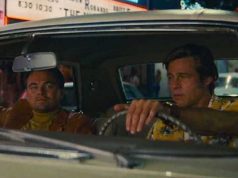
It’s hard to imagine, but there was a time when many Americans, including some elected officials, were convinced that our country was threatened by the very existence of certain foreign ideologies, and that it was necessary to keep an eye on any American citizen holding those beliefs, even though holding them was not against the law.
Crazy, right? It could never happen today.
“Trumbo” is the story of one particular Hollywood screenwriter, Dalton Trumbo, who was blacklisted when he refused to tell the House Un-American Activities Committee whether he or anyone else he knew in showbiz was a member of the Communist Party. (He was — officially from 1943-1948, but he’d been involved since the ’30s.) Like the man himself, the film is witty and entertaining, and it makes its points gracefully. But unlike Trumbo, “Trumbo” has trouble getting below the surface, and it never rises to the level of classic Hollywood biopic.
The raw material is there, though. Played here by Bryan Cranston, Trumbo in 1947 is the highest-paid screenwriter in Hollywood, happily married to the like-minded Cleo (Diane Lane) and friends with fellow lefties like Edward G. Robinson (Michael Stuhlbarg) and a cadre of screenwriters. Quick with a joke, good at parties, and with a cigarette holder always in one hand, he’s not the wild-eyed anarchist you might expect. As his screenwriter friend Arlen Hird (Louis C.K.) puts it, “You talk like a radical, but you live like a rich guy.” Trumbo’s reply: “It’s the perfect combination. The radical may fight with the purity of Jesus, but the rich guy wins with the cunning of Satan.” (Later in the film, Hird says, “Do you have to say everything like it’s going to be chiseled into a rock?”)
At the other end of the political spectrum is the Motion Picture Alliance, headed by John Wayne (David James Elliott) and devoted to rooting out any communists or other “non-patriots” working in Hollywood. The MPA has gossip columnist Hedda Hopper (Helen Mirren) on its side, fanning the fires of Red Scare paranoia. Why, Hollywood might be putting secret Soviet messages in its films, corrupting our impressionable youth! Won’t someone think of the children??
Trumbo refuses to answer Congress’ questions and serves prison time for contempt, but the meat of the story is after that, when he organizes his fellow blacklisted writers so they can all keep working. Nobody in the 1950s will openly hire a blacklistee, but a handful of studio bosses have no problem employing them secretly. Trumbo gets steady work writing for the King brothers, Frank (John Goodman) and Hymie (Stephen Root), schlockmeisters who don’t care if the script is good as long as it’s done on time. He also writes two Oscar-winning screenplays during this time, “Roman Holiday” and “The Brave One,” one attributed to someone else and the other credited to a pseudonym.
Jay Roach, who directed the Austin Powers movies and “Meet the Parents” but has recently focused on political subjects (“The Campaign,” plus TV docudramas “Recount” and “Game Change”), runs “Trumbo” like a zippy backstage comedy. For fans of old-timey Hollywood, it’s fun to see people like Edward G. Robinson and Kirk Douglas (Dean O’Gorman) being impersonated, and to witness the sausage-making from a safe distance. Though Trumbo’s and others’ careers are at stake, the screenplay (by TV scribe John McNamara) doesn’t get bogged down by negatives, nor does it get preachy about Trumbo’s ideals.
The light touch is welcome, and levity isn’t the same as un-seriousness. What keeps the film from reaching its potential — and it pains me to say this — is Bryan Cranston’s performance. As terrific an actor as he usually is, here he plays Trumbo like a character, not a person, with an affected speaking voice and the general manner of a two-dimensional figure. While those around him give depth to the people they play, Cranston remains at surface level, as if determined not to lose himself in Trumbo. As a result, the movie is fun, but that’s just about all it is. It could have been more.
B (2 hrs., 4 min.; )





